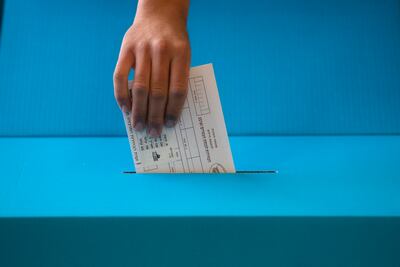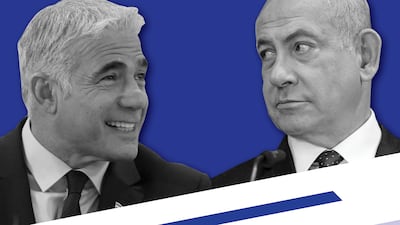For years Benjamin Netanyahu was in a class of his own in Israeli politics, or, as one of his election slogans said, often displayed alongside photographs of him standing beside world leaders: “A different league”. He was the mastermind, not just of his election campaigns, plotting out every move with a small team of experts and loyal aides, but also building coalitions with ruthless pragmatism.
Mr Netanyahu would secure in advance, long before the actual elections, the alliances he needed with other parties so he could guarantee his majority, even before one vote was cast.
But in the last election, in March 2021, a worthy rival finally emerged. Yair Lapid, unlike any of the previous party leaders who previously challenged Mr Netanyahu, adapted his methods, looking out not only for his own party’s result, but those of his potential coalition partners as well.
Mr Lapid was at a disadvantage. Mr Netanyahu over long years of political trading had built his cohesive bloc of right-wing and religious parties, each keeping to their own electoral turf and deferring to his leadership. Mr Lapid had a much more difficult, diverse bunch of small parties to deal with. They wouldn’t listen to him and he still needed to be aware that by campaigning too hard, he could push one of his potential allies beneath the electoral threshold of 3.25 per cent, losing their voters. Even after the election results were known, and Mr Netanyahu’s coalition failed to win him a majority, the numbers for Mr Lapid simply didn’t add up. There were too many small parties to deal with and their differences were too wide to build a new coalition.
But then Mr Lapid did something that Mr Netanyahu could never contemplate. To convince Naftali Bennett, the leader of a small, right-wing party to join a government that included also left-wingers and even an Islamist party, he offered to give him the first half of the prime-ministerial term, which should have been all his as leader of the coalition’s largest party.
Mr Netanyahu had dismissed and mocked Mr Lapid from the moment the former chat-show host entered politics in 2012. In the last election, his Likud campaign ran a 20-year-old clip in which Mr Lapid said “I don’t understand anything about economics” on a constant loop. But Mr Lapid persevered. Other centrist parties in Israel lasted barely a couple of election cycles, but Mr Lapid had studied their mistakes carefully (his father, Tommy Lapid, had been leader of one of those now-defunct parties). He structured his own party, Yesh Atid, to avoid the internecine squabbling that brought the downfall of such parties. He retains complete control of Yesh Atid, dictating its policy and selecting its Knesset candidates. No internal opposition is allowed and candidates who deviate from the line or are seen as potential liabilities are ruthlessly dropped from the team.

In effect, Mr Lapid built with Yesh Atid what took Mr Netanyahu many years to achieve with Likud: a well-organised and highly-disciplined party that serves as his own personal platform to power.
Having a reliable party allowed Mr Lapid to weather the Israeli political storms that had swept away every challenger to Mr Netanyahu over the past decade and a half, and when the moment came, form a coalition to replace him.
Sixteen months have passed. That coalition lasted for just one year. Naftali Bennett is gone and in his place, Mr Lapid is caretaker prime minister. He is just four months in the job and already facing an election, scheduled for Tuesday, November 1.
This is Israel’s fifth election in less than four years. Politics remain paralysed, with the Israeli electorate split down the middle between the half of the country who support Mr Netanyahu and the half who don’t want to ever see him back in office. The only thing that has changed is that Mr Netanyahu and Mr Lapid have now swapped places.
The election will be decided by which one of them acclimatises better to the reversal of roles. The last time Mr Netanyahu campaigned as the challenger was back in 2009 – long before Mr Lapid, who has never contested an election as the incumbent prime minister, even entered politics. How has each of them adjusted to their change in status?
On the surface, it would seem, quite well. Mr Lapid has quickly grown accustomed to the “Rose Garden Campaign” style, using the trappings of office, foreign trips, a speech at the UN General Assembly, treaty signings and security briefings to frame himself as a natural prime minister. These four months have been critical for him to change Israelis’ perspective of him. No longer the wild young thing, but a safe pair of hands. And it is showing in the polls, with Yesh Atid’s numbers rising, trailing Likud by only five seats.
Mr Netanyahu, too, seems to have taken well to his new role as insurgent challenger. Without a prime ministerial schedule and entourage, he has more freedom to just pop up anywhere in the country and ply the crowds with his charm and wit. He even seems to be enjoying it.
But not everything is working that well for both of them. Mr Netanyahu, who as prime minister exercised near total-control over the allied parties in his coalition, is struggling to keep them in line. The ultra-Orthodox party United Torah Judaism is causing trouble. One wing of it seems to be entertaining the possibility of joining another coalition if Mr Netanyahu fails to win his majority.
The leader of another wing of UTJ has been making problematic statements, such as “mathematics didn’t help Israel’s economy”, that draw unwanted attention to the obscurantist views of some of his partners. Not the kind of thing wavering voters should be seeing. And then there’s the far-right Religious Zionism party that chose to present its legal reform programme, severely curtailing the powers of the Supreme Court, without clearing it first with Mr Netanyahu.
He isn’t necessarily against the programme. In fact, it could help him get out of his own corruption case. But the electoral timing, once again, is awful and could push voters away from Likud.
Losing the prime minister job, even if he is poised to make a comeback, has somewhat diminished Mr Netanyahu’s power over his allies.
Mr Lapid never expected to control the unruly parties of the centre-left, but as prime minister he is proving adept at doing what Mr Netanyahu used to be so good at: “drinking up” the votes of allied parties whenever he chooses. Mr Lapid is tempted to do so now to the parties of his bloc, enticing voters with the prospect of a drawing even with Likud. But if he goes too far, the smaller parties to his left, Labour and Meretz, could be pushed beneath the threshold and Mr Netanyahu will have his majority. But the temptation may prove too great for the new prime minister, who risks being just slightly intoxicated with power.
Mr Netanyahu’s challenge is to regain his hold over his allies. Mr Lapid’s is to regain his own sense of discipline. That is the key to either of them winning on Tuesday.



